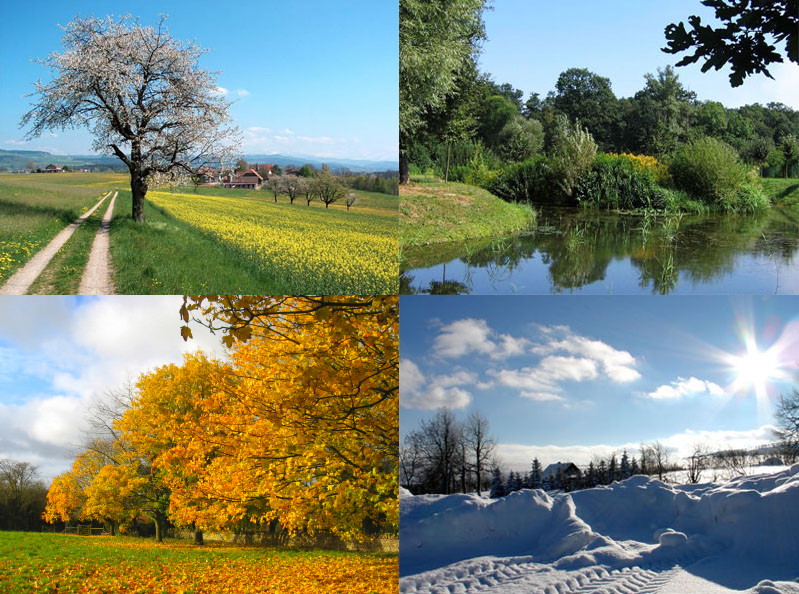A Comprehensive Guide To Nature's Cycle

The Four Seasons are a remarkable phenomenon that defines the natural world's rhythm, shaping our environment, culture, and lifestyle. They are not just mere changes in weather; they are a vital aspect of life on Earth, influencing agriculture, biodiversity, and even our emotional well-being. Understanding the four seasons can enhance our appreciation of nature and help us adapt to the changing environment.
In this article, we will explore the essence of the four seasons: Spring, Summer, Autumn, and Winter. Each season brings its unique characteristics, cultural significance, and impact on the ecosystem. Through this exploration, we aim to provide insights into how these seasonal changes affect our lives and the world around us.
Join us on this journey through the seasons as we delve into their features, the science behind them, and their importance in various cultures around the globe. Whether you are a nature enthusiast, a student, or simply someone looking to learn more about the world, this article is tailored for you.
Table of Contents
1. Spring: The Season of Renewal
Spring is often associated with rebirth and rejuvenation. As temperatures begin to rise and daylight increases, nature awakens from its winter slumber. Flowers bloom, trees regain their leaves, and animals emerge from hibernation. This season is marked by vibrant colors and fresh scents, making it a favorite time for many.
Characteristics of Spring
- Temperature: Generally warmer than winter.
- Flora: Flowers like tulips, daffodils, and cherry blossoms bloom.
- Fauna: Many animals give birth in spring, leading to an increase in wildlife activity.
- Weather: Rainfall increases, supporting plant growth.
Spring Celebrations
Various cultures celebrate the arrival of spring through festivals and rituals. For example:
- Holi: The Hindu festival of colors, celebrating the arrival of spring.
- Easter: A Christian holiday symbolizing resurrection and new beginnings.
- Cherry Blossom Festivals: Celebrated in Japan, marking the blooming of sakura trees.
2. Summer: The Season of Growth
Summer is characterized by longer days, warmer temperatures, and vibrant life. This season is essential for agricultural growth, as crops reach maturity. The sun shines brightly, encouraging outdoor activities and social gatherings.
Characteristics of Summer
- Temperature: Warm to hot, with some regions experiencing extreme heat.
- Flora: Full bloom of flowers and crops, including sunflowers and corn.
- Fauna: Increased animal activity, with many species in their breeding season.
- Weather: Generally dry, although some regions may experience monsoons.
Summer Activities
Summer is a time for fun and relaxation. Popular activities include:
- Beach outings and water sports.
- Camping and hiking adventures.
- Barbecues and outdoor parties.
3. Autumn: The Season of Harvest
Autumn, or fall, is a time of transition. As temperatures cool and days shorten, leaves begin to change color, creating a stunning landscape of reds, oranges, and yellows. This season is crucial for agriculture, as crops are harvested and prepared for winter.
Characteristics of Autumn
- Temperature: Cooling down from summer heat.
- Flora: Trees shed leaves, and harvests of fruits and vegetables occur.
- Fauna: Many animals prepare for winter by gathering food.
- Weather: Increased rainfall and windy conditions.
Autumn Celebrations
Autumn is celebrated in various ways, including:
- Thanksgiving: A holiday in the USA and Canada to give thanks for the harvest.
- Oktoberfest: A German festival celebrating beer and harvest.
- Halloween: A celebration with roots in ancient harvest festivals.
4. Winter: The Season of Rest
Winter is marked by cold temperatures, snow, and a sense of stillness in nature. Many animals hibernate or migrate, while trees become bare. However, winter also brings a unique beauty and opportunities for various activities.
Characteristics of Winter
- Temperature: Cold, often below freezing in many regions.
- Flora: Trees are bare, and many plants go dormant.
- Fauna: Hibernation and migration are common among various species.
- Weather: Snowfall and frosty conditions are typical.
Winter Activities
Winter offers unique experiences, such as:
- Skiing and snowboarding.
- Ice skating and snowshoeing.
- Cozy indoor activities like reading and crafting.
5. Cultural Significance of the Seasons
The four seasons hold significant cultural meaning across the globe. Different cultures have developed unique traditions, festivals, and practices that reflect the seasons' changes. For instance, many agricultural societies have harvest festivals in autumn, while spring is often associated with themes of rebirth and renewal.
Global Festivals
Some notable seasonal festivals include:
- Songkran: The Thai New Year celebrated in April, marking the arrival of the rainy season.
- Mid-Autumn Festival: A harvest festival celebrated in several Asian cultures.
- Winter Solstice Festivals: Celebrated worldwide, acknowledging the longest night of the year.
6. The Impact of Seasons on Ecosystems
The four seasons significantly impact ecosystems and biodiversity. Each season plays a crucial role in maintaining ecological balance and supporting life.
Seasonal Changes in Ecosystems
- Spring: Triggers plant growth and animal reproduction.
- Summer: Supports high levels of primary productivity.
- Autumn: Provides a critical time for harvesting and preparing for winter.
- Winter: Allows ecosystems to rest and regenerate.
7. Activities to Enjoy in Each Season
Every season offers unique activities that allow us to engage with nature and enjoy the outdoors. Here are some suggestions:
Spring Activities
- Gardening: Planting flowers and vegetables.
- Hiking: Enjoying the blooming landscape.
- Photography: Capturing nature's beauty in bloom.
Summer Activities
- Visiting farmers' markets: Enjoying fresh produce.
- Outdoor sports: Swimming, soccer, and more.
- Traveling: Exploring new destinations.
Autumn Activities
- Apple picking: Participating in harvest activities.
- Leaf peeping: Enjoying the changing foliage.
- Crafting: Creating autumn-themed decorations.
Winter Activities
- Building snowmen: Enjoying winter's fun.
- Holiday celebrations: Participating in winter festivities.
- Indoor hobbies: Reading, cooking, and crafting.
8. Conclusion
In conclusion, the four seasons profoundly impact our lives, shaping our environment, culture, and daily activities. Understanding the characteristics and significance of each season enhances our appreciation for the natural world. We encourage you to embrace the uniqueness of each season
ncG1vNJzZmirn521b6%2FOpmasp5idu6bD0pusrGppZMGpsYyfpq6qXaiyor%2FOp6pnoKSiuQ%3D%3D